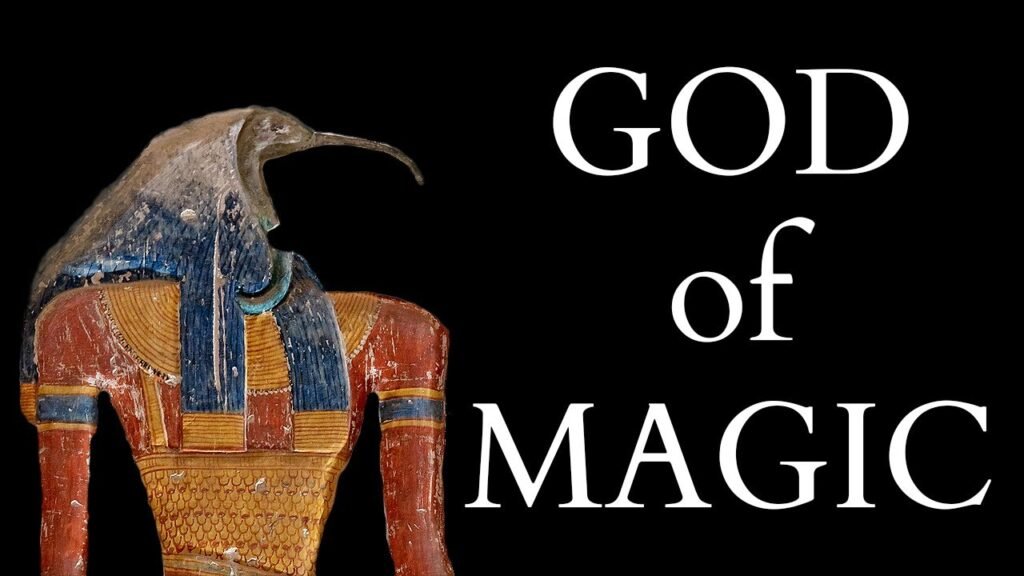Thoth, also known as Djehuty, was one of the most important gods in ancient Egyptian mythology. He was revered as the deity of wisdom, writing, magic, and measurement. The influence and significance of Thoth extended throughout every aspect of Egyptian society, from the common people to the highest priests and pharaohs. In this article, we will delve into the rich mythology surrounding Thoth, exploring his various roles, associations, and the remarkable temple dedicated to him in Hermopolis.
The Many Faces of Thoth
Thoth possessed a multitude of roles and attributes, making him one of the most complex and revered gods in the Egyptian pantheon. His most prominent roles included:
- God of Wisdom: Thoth was widely renowned for his unparalleled wisdom and knowledge, which he generously shared with humanity. He was regarded as the patron of scribes, scholars, and intellectuals, and was often depicted carrying a writing palette and scroll.
- God of Writing and Language: Thoth was credited with the invention of hieroglyphs, the ancient Egyptian writing system, which he bestowed upon the people to communicate, record events, and preserve knowledge. Egyptians considered writing a sacred art, and Thoth was often associated with divine communication and the power of words.
- God of Magic and Medicine: Thoth was regarded as a powerful magician and healer. He was believed to possess the knowledge of magical spells and incantations, which he used to protect the gods and assist humans in their daily lives. Thoth was also associated with the field of medicine, as he was believed to have knowledge of pharmacology and healing arts.
- God of Time and Measurement: Thoth was responsible for maintaining order and balance in the universe. He ensured the proper functioning of the cosmic cycles, including the measurement of time and the organization of the calendar. The Egyptians saw time as a divine concept, and Thoth’s role as the measurer of time elevated his status to that of a celestial arbiter.
- Judge of the Dead: In the afterlife, Thoth played a crucial role in the weighing of the deceased’s heart against the Feather of Ma’at, the goddess of truth and justice. As the scribe of the gods, it was his task to record the outcome of this judgment, ensuring that the balance of cosmic order was maintained.
These varied roles demonstrate the breadth of Thoth’s influence and the reverence in which the ancient Egyptians held him.
The Temple of Thoth in Hermopolis
Among the many places of worship dedicated to Thoth, the temple at Hermopolis was the most significant and prestigious. Located in the city of Hermopolis Magna, present-day el-Ashmunein in Egypt, this grand temple complex stood as a testament to Thoth’s importance and the devotion he inspired.
The Temple of Thoth in Hermopolis was divided into multiple sections, reflecting different aspects of Thoth’s persona and his role in Egyptian mythology. One of the prominent features of the temple was the central sanctuary, which housed the sacred statues of Thoth and other deities. The sanctuary was accessible only to the high priests and pharaohs, emphasizing the exclusivity and holiness of the inner sanctum.
The temple complex also included vast administrative buildings, storerooms, libraries, and lecture halls. These spaces served as centers for learning, where the knowledge of Thoth and other esoteric subjects were imparted to the initiated priests and select scholars. The libraries housed countless scrolls and texts, containing valuable information on various branches of knowledge and magic.
Outside the main temple structure, elaborate courtyards and processional avenues were adorned with intricately carved reliefs and statues, depicting scenes from Thoth’s mythology and showcasing his many roles. Pilgrims and worshippers would follow these avenues, participating in religious rituals and seeking the blessings of Thoth.
The Temple of Thoth in Hermopolis served not only as a place of worship but also as an educational and cultural center. It was a hub of intellectual pursuits, attracting scholars and seekers of knowledge from all corners of ancient Egypt. The temple’s influence extended beyond religious matters, impacting fields such as medicine, mathematics, and language.
Legacy and Depiction in Art
The imagery and representation of Thoth varied throughout ancient Egyptian history, evolving alongside the changing beliefs and artistic styles of different periods. However, there were certain consistent elements in Thoth’s depictions that remained constant through the millennia.
Thoth was generally depicted as a man with the head of an ibis, a long-beaked bird associated with wisdom and knowledge in ancient Egypt. The choice of the ibis as Thoth’s sacred animal is believed to have stemmed from the bird’s keen intellect and its ability to navigate the realms of both land and sky.
Furthermore, Thoth was often depicted wearing various symbols and regalia associated with his different roles. These symbols included a lunar disc on his head, representing his role in measuring time, and a pen and palette, symbolizing his association with writing and wisdom. Thoth’s depictions frequently showcased his divine authority and knowledge, emphasizing his elevated status among the gods.
Thoth’s legacy endured long after ancient Egyptian civilization declined. The influence of his worship and his associations with wisdom and magic can be seen in various cultures that were influenced by ancient Egypt. Greek and Roman traditions assimilated Thoth into their own pantheons, equating him with their own gods Hermes and Mercury, respectively.
In Conclusion
Thoth, the god of wisdom, writing, magic, and measurement, held a paramount position in ancient Egyptian mythology. His diverse roles and associations spanned religion, education, and everyday life, making him a ubiquitous presence in the ancient Egyptian world. The grand Temple of Thoth in Hermopolis served as a focal point of his worship and intellectual pursuits, shaping the cultural and intellectual landscape of ancient Egypt. Even today, the enigmatic figure of Thoth continues to captivate the imagination, reminding us of the importance of wisdom, knowledge, and the power of words in our own lives.
